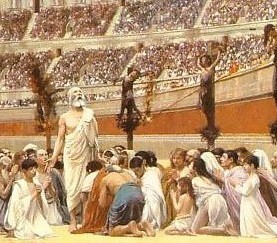It got to him. It got to him while he was laughing at some little vulgarity or wickedness. He did not know that his laughter benumbed him to the hideous shadow slipping into his thoughts.
It infected him…
Then he then became his own nightmare, in that he was willing to destroy himself that he may wound his enemy.
Be afraid. Be very afraid. This dark, suicidal presence that cannot yet be conceived of, is standing so close its breath is upon your neck.
"Yes, laugh, mock. It feels good."
"It has no power. You have power."
Those calming whispers do not come from rational men, but from the very ghoul itself. It wants you to believe it is playing, teasing you. It wants you to believe it will have mercy upon the nice people. That it is forgiving and ….. likes you. That somehow you will be the exception when it begins to rule. You will be a favorite in its kingdom. Do not be that stupid.
This dark unstoppable force is very much like the zombies in the clip above.
It is sin.
If sin doesn't scare the hell out of you, then you do not know sin. Sin is your most frightening enemy. It doesn't just want you, it wants your siblings, your spouse, your children.
Sin's obsession with you has nothing to do with hate, for it has no feelings towards humans--you mean nothing to it for it has no heart, no understanding. It is not rational and cannot be persuaded by the greatest human genius. It gives no thought to the innocent or the elderly or the kind-hearted or most sincere. It's goal is utter annihilation. And you cannot join its side and live through it.
Sin's obsession with you has nothing to do with hate, for it has no feelings towards humans--you mean nothing to it for it has no heart, no understanding. It is not rational and cannot be persuaded by the greatest human genius. It gives no thought to the innocent or the elderly or the kind-hearted or most sincere. It's goal is utter annihilation. And you cannot join its side and live through it.
Sin has declared war on you and your family whether or not you wish to fight. And it is unstoppable until you and the entire world is destroyed.
You cannot become a conscientious objector in this battle against sin. You have no hiding place. Do you believe that if you are quiet and still, this evil will not see you?… It has eyes all around and while you cower in a dark corner an axe is poised above your head. It will win. Destruction will win at any cost and it is not playing.
While Christians are right in that Christ won the cosmic war with Satan, those of us on earth are still left vulnerable to sin's madness if we have not put on the whole armor of God.
Look at what sin did to the Creator and He who is love itself. (Ephesians 6)
That day of evil is here. Will you be able to stand?


























/images/scan0005.jpg)

